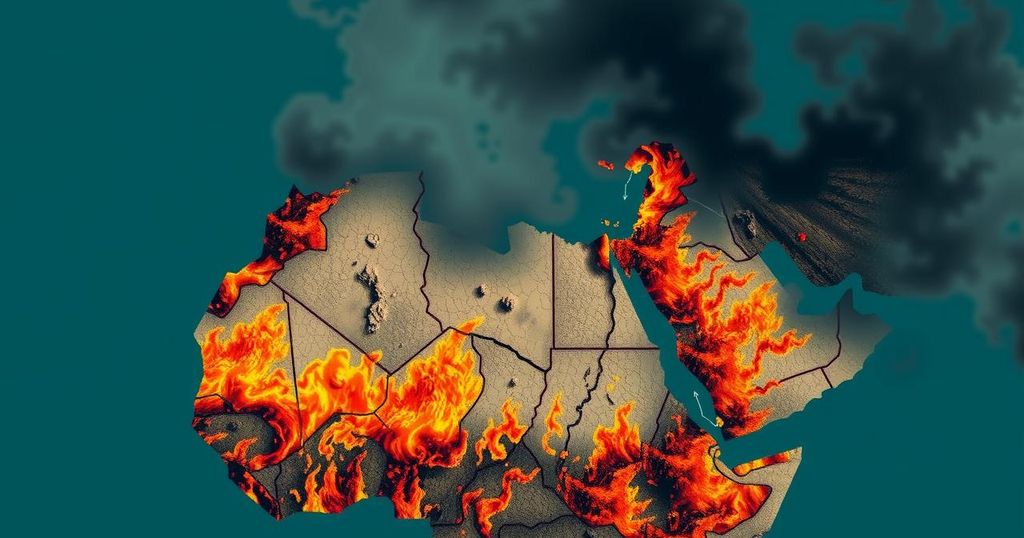Urgent Humanitarian Crises and Human Rights Challenges in Syria, Iran, and South Sudan

The ongoing violence in Syria continues to worsen humanitarian conditions, leading to a suspension of aid operations after a deadly airstrike. Iranian survivors of the 2022 protests are demanding accountability for human rights violations. South Sudan is preparing for its first democratic elections in 2026, with calls for improved civic freedoms and governance measures.
The humanitarian situation in Syria remains critical as ongoing violence exacerbates conditions for civilians. Reports emerged of a brutal airstrike at the Ad Dabousiyah border crossing with Türkiye, resulting in multiple casualties, including a volunteer from the Syrian Arab Red Crescent (SARC). In response to this episode, the UN Office for the Coordination of Humanitarian Affairs (OCHA) has halted all humanitarian operations at border crossings, stressing the urgent need for the protection of aid workers under international law.
In addition, Deputy Regional Humanitarian Coordinator David Carden raised concerns regarding the escalating hostilities in Idlib and western Aleppo. Recent artillery bombardments have inflicted tragedy upon local children, leading to fatalities and injuries amongst schoolchildren and forcing numerous NGOs to cease their lifesaving activities. Furthermore, vital health facilities and schools have been forced to close amidst the violence.
Cross-border aid deliveries, however, are still ongoing through the Bab Al-Hawa crossing, with medical supplies being delivered to Idlib by the WHO, UNHCR, and UNICEF. Meanwhile, in Iran, survivors of the 2022 “Women, Life, Freedom” protests are calling for accountability for the gross human rights violations that occurred during the state’s brutal crackdown on dissent. The Independent International Fact-Finding Mission gathered testimonies from over 50 Iranian refugees, outlining severe abuses faced during the protests, particularly following the death of Jina Mahsa Amini.
The Chair of the Fact-Finding Mission, Sara Hossain, emphasized the necessity of a victim-centric approach to justice and accountability, highlighting the ongoing repression faced by families of victims. The mission is set to deliver a report to the Human Rights Council in March 2025, discussing accountability mechanisms and recommendations for support for victims.
Finally, the UN Mission in South Sudan has urged provincial governors to strengthen civic and political freedoms in anticipation of the upcoming democratic elections scheduled for December 2026. UNMISS Chief Nicholas Haysom addressed the annual Governors’ Forum, advocating for essential public service delivery and a conducive environment for electoral participation. He urged the commencement of training for necessary security entities to enhance national security as the elections draw nearer.
The humanitarian crisis in Syria has been intensifying due to ongoing conflict, which has severely impacted civilians and humanitarian operations. The UN has reported alarming incidents that further complicate aid delivery. In Iran, the aftermath of protests against the regime has led to substantial human rights violations that survivors demand be addressed. Additionally, South Sudan is poised for its first democratic elections, necessitating an emphasis on civic freedoms and effective governance to ensure a successful electoral process.
The situations in Syria, Iran, and South Sudan highlight pressing humanitarian, human rights, and political challenges. While the humanitarian crisis in Syria necessitates urgent protection measures for aid workers and civilians, survivors of Iran’s protests are rallying for justice. In South Sudan, efforts to establish civic freedoms are crucial in preparation for forthcoming elections. Collaborative international efforts are essential to address these intertwined crises effectively.
Original Source: www.miragenews.com








